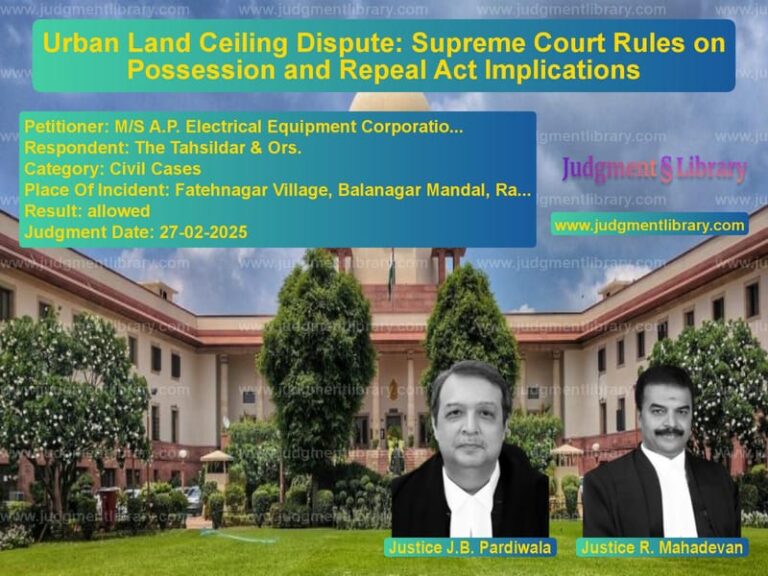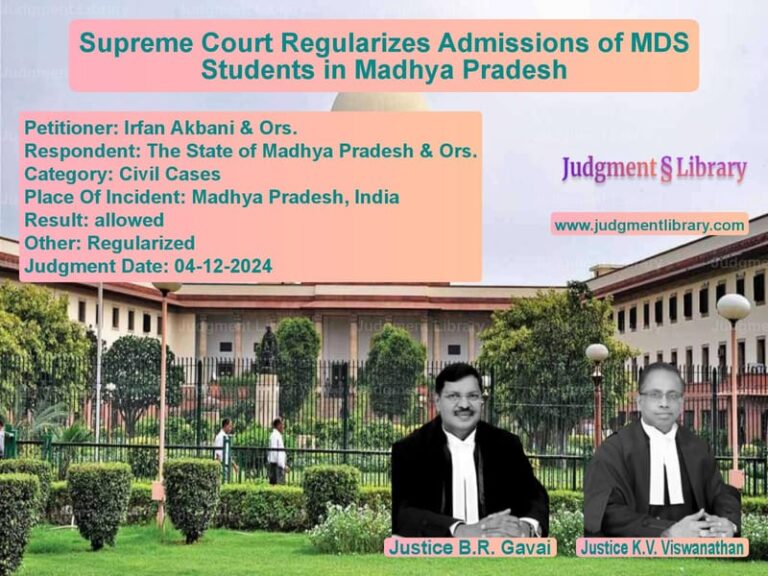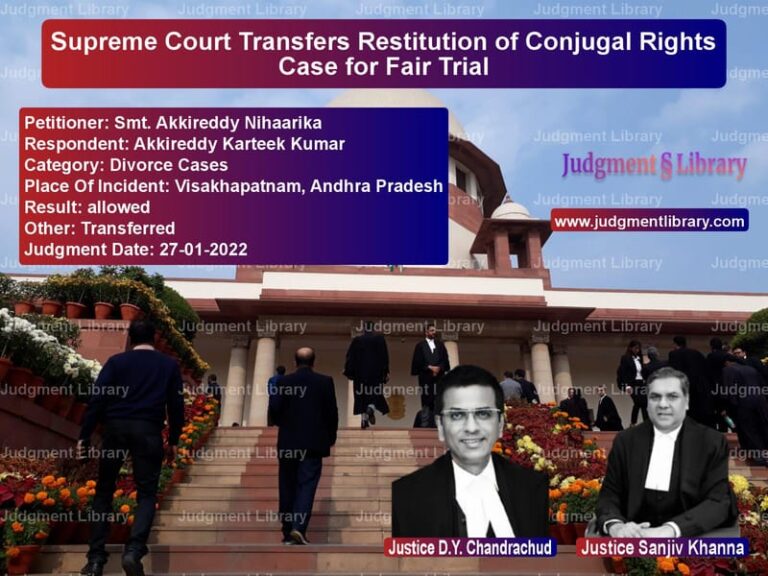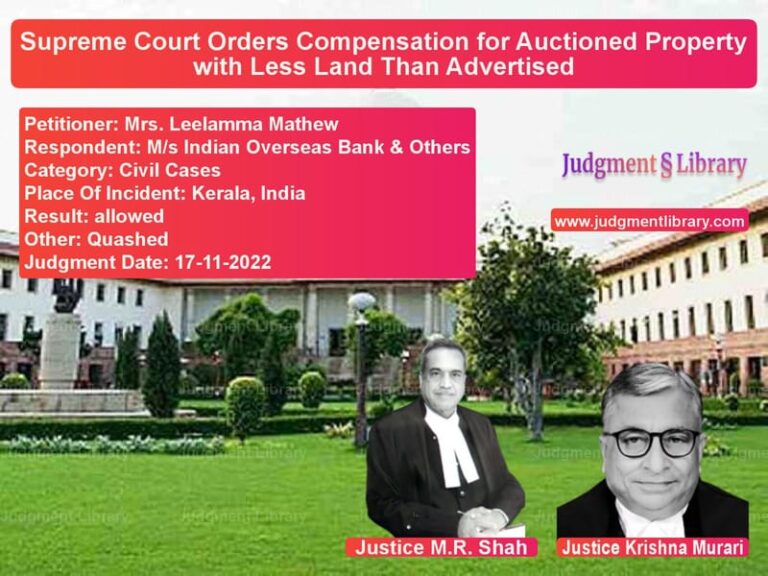Arnab Goswami Case: Freedom of Speech vs. Criminal Proceedings
The case of Arnab Ranjan Goswami vs. Union of India & Others is a landmark judgment dealing with the fundamental right to freedom of speech and expression under Article 19(1)(a) of the Indian Constitution. The case arose when multiple FIRs and criminal complaints were filed against Arnab Goswami, Editor-in-Chief of Republic TV, after his news broadcasts concerning the Palghar lynching incident.
Background of the Case
Arnab Goswami, a journalist and television news anchor, hosted news debates on Republic TV and its Hindi channel, R Bharat, questioning the police investigation into the lynching of two sadhus and their driver in Palghar, Maharashtra, on April 16, 2020. Following these broadcasts, multiple FIRs and criminal complaints were registered against him across several states, alleging that his statements incited communal hatred and defamed political leaders.
Goswami approached the Supreme Court under Article 32, seeking the quashing of the FIRs and protection from arrest, arguing that the complaints were politically motivated attempts to suppress his journalistic freedom.
Key Issues
- Whether multiple FIRs on the same issue violated legal principles.
- Whether the criminal proceedings infringed upon freedom of speech and expression.
- Whether the investigation into the case should be transferred to an independent agency like the Central Bureau of Investigation (CBI).
- Whether Goswami was being targeted due to his critical reporting of government authorities.
Arguments of the Petitioner (Arnab Goswami)
Goswami contended that:
- The multiple FIRs were identical, arising from the same cause of action, and thus constituted an abuse of legal process.
- The FIRs were filed in states governed by opposition political parties, suggesting political vendetta.
- His broadcasts were an exercise of his fundamental right to free speech under Article 19(1)(a) and did not incite violence or hatred.
- The Mumbai police investigation was biased and targeted his media organization.
- The case should be transferred to the CBI to ensure a fair and impartial investigation.
Arguments of the Respondents (Union of India & Various State Governments)
The state governments and complainants argued that:
- The broadcasts were communal in nature and could incite violence.
- The complaints were filed by aggrieved individuals, not political parties.
- Freedom of speech under Article 19(1)(a) is subject to reasonable restrictions under Article 19(2), which includes public order and incitement to violence.
- The Mumbai police was conducting a lawful investigation, and there was no need for CBI intervention.
Supreme Court’s Judgment
The Supreme Court ruled in favor of Goswami on certain aspects while allowing investigations in others. The key findings were:
1. Quashing of Multiple FIRs
The Court quashed all FIRs and complaints across different states, except for the FIR filed at NM Joshi Marg Police Station, Mumbai. The Court relied on the precedent set in TT Antony vs. State of Kerala, which states that multiple FIRs on the same incident are impermissible.
“The filing of multiple FIRs arising out of the same telecast is an abuse of process and impermissible.”
2. Protection of Journalistic Freedom
The Court reaffirmed that journalistic freedom is integral to democracy:
“India’s freedoms will rest safe as long as journalists can speak truth to power without being chilled by a threat of reprisal.”
However, the Court clarified that the freedom of speech is not absolute and must be exercised responsibly.
3. No Transfer to CBI
The Court rejected Goswami’s request to transfer the investigation to the CBI, stating:
“The transfer of an investigation to the CBI is not a matter of routine but an extraordinary power to be exercised sparingly.”
The Court found no valid reason to suspect bias in the Mumbai police investigation.
4. Criminal Defamation Not Covered
The Court clarified that the Mumbai FIR did not cover criminal defamation and thus, no prosecution could be launched under Section 499 of the Indian Penal Code (IPC).
5. Temporary Protection from Arrest
The Court granted Goswami protection from coercive action for three weeks to enable him to seek legal remedies, including anticipatory bail.
Impact of the Judgment
This ruling has significant implications for freedom of speech, criminal law, and media regulation:
- It prevents misuse of criminal law to stifle dissenting voices.
- It upholds the principle that multiple FIRs on the same cause of action are illegal.
- It clarifies the scope of journalistic freedom within the boundaries of reasonable restrictions.
- It reinforces judicial oversight in politically sensitive cases.
Conclusion
The Supreme Court’s ruling in Arnab Ranjan Goswami vs. Union of India serves as an important precedent on free speech and media rights. While the Court protected Goswami from multiple FIRs and harassment, it upheld the need for a lawful investigation into any criminal allegations. The judgment strikes a balance between freedom of the press and responsible journalism, ensuring that journalists can operate without undue fear while remaining accountable to the law.
Petitioner Name: Arnab Ranjan Goswami.Respondent Name: Union of India & Others.Judgment By: Justice D.Y. Chandrachud, Justice M.R. Shah.Place Of Incident: Maharashtra.Judgment Date: 19-05-2020.
Don’t miss out on the full details! Download the complete judgment in PDF format below and gain valuable insights instantly!
Download Judgment: Arnab Ranjan Goswami vs Union of India & Oth Supreme Court of India Judgment Dated 19-05-2020.pdf
Direct Downlaod Judgment: Direct downlaod this Judgment
See all petitions in Criminal Defamation
See all petitions in Public Interest Litigation
See all petitions in Constitution Interpretation
See all petitions in Fundamental Rights
See all petitions in Separation of Powers
See all petitions in Judgment by Dhananjaya Y Chandrachud
See all petitions in Judgment by Mukeshkumar Rasikbhai Shah
See all petitions in partially allowed
See all petitions in Remanded
See all petitions in supreme court of India judgments May 2020
See all petitions in 2020 judgments
See all posts in Defamation Cases Category
See all allowed petitions in Defamation Cases Category
See all Dismissed petitions in Defamation Cases Category
See all partially allowed petitions in Defamation Cases Category







